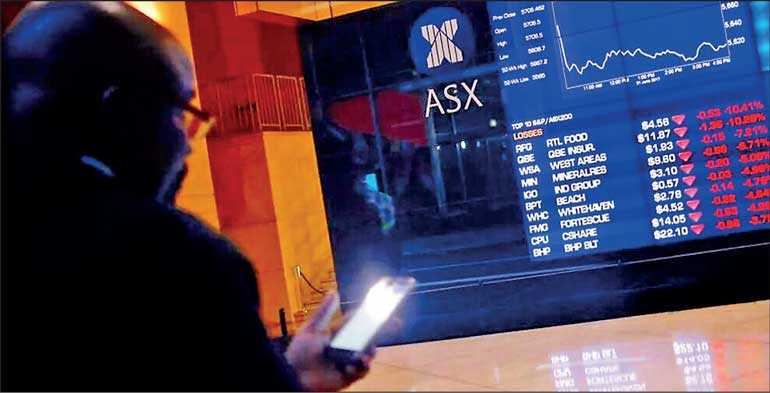Monday Feb 23, 2026
Monday Feb 23, 2026
Friday, 2 August 2019 00:00 - - {{hitsCtrl.values.hits}}

SYDNEY (Reuters): Asian shares fell to six-week lows on Thursday while the dollar jumped to two-year highs as the US Federal Reserve poured cold water on market expectations of a lengthy easing cycle following a 25 basis-point rate cut.
MSCI’s broadest index of Asia-Pacific shares outside Japan faltered 0.6%, extending losses for a fifth day to the lowest since mid-June.
Japan’s Nikkei reversed early losses and were a shade higher, while Australian shares declined 0.2%. Losses in Chinese shares accelerated after it opened lower with the blue-chip index down 0.8%.
E-minis for the S&P500 clawed back early losses and were marginally higher, after a sharp drop on Wall Street.
Global share markets recoiled overnight after US Federal Reserve Chairman Jerome Powell said Wednesday’s easing was “not the beginning of a long series of rate cuts”.
Powell characterised the rate cut as “a mid-cycle adjustment to policy”, citing signs of a global slowdown, simmering US trade tensions and a desire to boost too-low inflation. Markets took that as a sign that sharp further cuts were not imminent.
Riskier assets such as shares have had a golden run in the past decade as global central banks have kept monetary policies stimulatory, world growth has been strong and corporate profits have surged. But there are now growing worries over how much longer the rally can run as trade disputes drag on the global economy.
“We believe the Fed is trying to thread the needle, balancing market jitters about slowing global growth with robust consumer spending and a strong job market in the US,” said Nick Maroutsos, co-head of global bonds at Janus Henderson.
“In other words, by cutting just 25 bps, the Fed is trying to bolster market confidence while also keeping some dry powder in reserve in case of an economic shock.”
The United States and China on Wednesday ended a brief round of trade talks without much progress in ending their year-long tariff war.
Downbeat data and factory surveys on Thursday pointed to further weakness for Asia’s trade-reliant economies.
South Korea’s exports tumbled for an eighth straight month in July amid persistently weak global demand and an escalating dispute with Japan, while its new export orders shrank the most in about six years.
South Korea, the world’s sixth-largest exporter, is the first major industrial economy to release trade data each month, providing an early assessment on the health of global demand.
Pressure on Chinese factories eased slightly, but manufacturing activity continued to shrink.
“The broader global trade dynamic remains a challenge,” Morgan Stanley strategist Michael Zezas said, referring to trade skirmishes between Japan and South Korea and US-Europe negotiations over auto tariffs.
“Trade should continue to drag on corporate confidence, capex and global growth in the near term.”
Gold and bonds
Yields on US Treasuries rose as investors scaled back expectations for at least 100 basis points of easing in the near term.
Yields on 10-year bonds climbed as high as 2.053% in early Asian hours from a US close of 2.007%. They were last at 2.037%.
In foreign exchange, the dollar enjoyed a broad-based rally against major currencies, including the euro and Antipodean currencies on expectations monetary policies in Europe, Australia and New Zealand will remain accommodative.
The dollar index against a basket of six major currencies finished July 2.5% higher and was last up 0.3% at 98.817. Against the Japanese yen, the dollar broke above 109 to jump to the highest since end-May.
The common currency fell to $ 1.1032, the lowest since May 2017. It was last at $ 1.1047.
The Aussie slipped below key chart support of $ 0.6832 to as low as $ 0.6828, a level not seen since early January when a currency ‘flash crash’ briefly took it to $ 0.6715.
The kiwi hit a six-week trough of $ 0.6535 as markets wager on a rate cut by the Reserve Bank of New Zealand next week.
US crude futures fell $ 1.08 to $ 57.95 per barrel in the wake of Powell’s comments on the rate outlook. Brent was down 91 cents at $ 64.46.
Spot gold made a new two-week trough on Thursday after falling to 1,405.50.